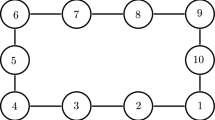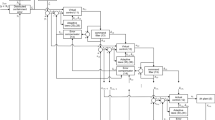Abstract
This paper focuses on discrete-time stochastic multi-agent systems, in which the stochastic noise can influence not only the states and the external disturbances but also the control inputs. Based on this model, the finite-horizon H∞ consensus control problem is analyzed to alleviate the effects of the disturbances and reach consensus simultaneously. By completing squares method, sufficient conditions for H∞ control protocols are established via a series of coupled Riccati difference equations. Finally, an algorithm is supplied and a numerical example is given to show the validity of our results.
Similar content being viewed by others
References
Y. F. Wu, L. L. Xiong, G. S. Zhai, and T. Wu, “Improved synchronization analysis for delayed Lur’e systems using improved technique,” International Journal of Control, Automation, and Systems, vol. 19, no. 4, pp. 1480–1490, April 2021.
Y. N. Jia and W. C. Zhang, “Distributed adaptive flocking of robotic fish system with a leader of bounded unknown input,” International Journal of Control, Automation, and Systems, vol. 12, no. 5, pp. 1049–1058, March 2014.
A. Amini, A. Asif, and A. Mohammadi, “A performance guaranteed sampled-data event-triggered consensus approach for linear multi-agent systems,” Information Sciences, vol. 484, pp. 338–349, January 2019.
J. L. Zhang, C. Xiang, and G. Gu, “State consensus for discrete-time multi-agent systems over time-varying graphs,” IEEE Transactions on Automatic Control, vol. 66, no. 1, pp. 346–353, March 2020.
J. W. Yi, Y. W. Wang, J. W. Xiao, and Y. Chen, “Consensus in second-order Markovian jump multi-agent systems via impulsive control using sampled information with heterogenous delays,” Asian Journal of Control, vol. 18, no. 5, pp. 1940–1949, September 2016.
H. Y. Zhao, S. Y. Xu, and D. M. Yuan, “Consensus of data-sampled multi-agent systems with Markovian switching topologies,” Asian Journal of Control, vol. 14, no. 5, pp. 1366–1373, August 2012.
Y. F. Su and J. Huang, “Two consensus problems for discrete-time multi-agent systems with switching network topology,” Automatica, vol. 48, no. 9, pp. 1988–1997, July 2012.
J. H. Seo, J. Back, H. Kim, and H. Shim, “Output feedback consensus for high-order linear systems having uniform ranks under switching topology,” IET Control Theory and Applications, vol. 6, no. 8, pp. 1118–1124, August 2012.
R. Sakthivel, R. Sakthivel, B. Kaviarasan, and F. Alzahrani, “Leader-following exponential consensus of input saturated stochastic multi-agent systems with Markov jump parameters,” Neurocomputing, vol. 287, pp. 84–92, February 2018.
Y. Wan, G. Wen, J. Cao, and W. W. Yu, “Distributed node-to-node consensus of multi-agent systems with stochastic sampling,” International Journal of Robust and Nonlinear Control, vol. 26, no. 1, pp. 110–124, January 2015.
H. Rezaee and F. Abdollahi, “Discrete-time consensus strategy for a class of high-order linear multiagent systems under stochastic communication topologies,” Journal of the Franklin Institute, vol. 354, no. 9, pp. 3690–3705, October 2016.
Y. S. Long, S. Liu, and L. H. Xie, “Distributed consensus of discrete-time multi-agent systems with multiplicative noises,” International Journal of Robust and Nonlinear Control, vol. 25, no. 16, pp. 3113–3131, November 2015.
X. Tan, J. Cao, X. Li, and A. Alsaedi, “Leader-following mean square consensus of stochastic multi-agent systems with input delay via event-triggered control,” IET Control Theory and Applications, vol. 12, no. 2, pp. 299–309, December 2018.
J. Han, H. G. Zhang, H. Jiang, and X. Sun, “H∞ consensus for linear heterogeneous multi-agent systems with state and output feedback control,” Neurocomputing, vol. 275, pp. 2635–2644, July 2018.
H. Fei, G. L. Wei, D. D. Ding, and Y. Song, “Finite-horizon H∞ consensus control for multi-agent systems with random parameters: The local condition case,” Journal of the Franklin Institute, vol. 354, no. 14, pp. 6078–6097, July 2017.
P. Lin, Y. M. Jia, and L. Li, “Distributed robust H∞ consensus control in directed networks of agents with time-delay,” Systems and Control Letters, vol. 57, no. 8, pp. 643–653, March 2008.
H. Zhang, R. H. Yang, H. C. Yan, and F. W. Yang, “H∞ consensus of event-based multi-agent systems with switching topology,” Information Sciences, pp. 623–635, November 2016.
T. Hou, J. Wang, and H. J. Ma, “Bounded real lemma for discrete-time stochastic systems with infinite Markov jumps,” Proc. of the 35th Chinese Control Conference, pp. 1856–1861, 2016.
Y. L. Huang, W. H. Zhang, and G. Feng, “Infinite horizon H2/H∞ control for stochastic systems with Markovian jumps,” Automatica, vol. 44, no. 3, pp. 857–863, November 2008.
T. Hou, J. Wang, Y. Y. Liu, and S. Xiao, “H2/H∞ control for MJLS with infinite Markov chain,” Mathematical Problems in Engineering, pp. 1–8, September 2017.
L. Sheng, Z. D. Wang, and L. Zou, “Output-feedback H2/H∞ consensus control for stochastic time-varying multi-agent systems with (x, u, v)-dependent noises,” Systems and Control Letters, vol. 107, pp. 58–67, July 2017.
G. H. Wen, G. Q. Hu, W. W. Yu, and G. R. Chen, “Distributed H∞ consensus of higher order multiagent systems with switching topologies,” IEEE Transactions on Circuits and Systems-II: Express Briefs, vol. 61, no. 5, pp. 359–363, May 2014.
L. Zou, Z. D. Wang, H. Gao, and F. E. Alsaadi, “Finite-horizon H∞ consensus control of time-varying multiagent systems with stochastic communication protocol,” IEEE Transactions on Cybernetics, vol. 47, no. 8, pp. 1830–1840, March 2017.
T. Hou, W. H. Zhang, and H. J. Ma, “Finite horizon H2/H∞ control for discrete-time stochastic systems with Markovian jumps and multiplicative noise,” IEEE Transactions on Automatic Control, vol. 55, no. 5, pp. 1185–1191, May 2010.
T. Hou, W. H. Zhang, and H. J. Ma, “A game-based control design for discrete-time Markov jump systems with multiplicative noise,” IET Control Theory and Applications, vol. 7, no. 5, pp. 773–783, January 2013.
Author information
Authors and Affiliations
Corresponding author
Additional information
This work was supported by the National Natural Science Foundation of China under Grants 61873248, the Hubei Provincial Natural Science Foundation of China under Grant 2017CFA030 and Grant 2015CFA010, and the 111 project under Grant B17040.
Jie Wang received her B.S. degree in mathematics and applied mathematics from Qufu Normal University, China, in 2014, and an M.S. degree in probability theory and mathematical statistics from Shandong University of Science and Technology in 2017. She is currently pursuing a Ph.D. degree in the School of Automation, China University of Geosciences. Her current research interests include consensus control for multi-agent systems.
Xin Chen received his B.S. and M.S. degrees from Central South University, Changsha, China, in 1999 and 2002, respectively. In 2003, he was recommended to University of Macao, Taipa, Macao S.A.R., China, to pursue his Ph.D. degree. He received his Ph.D. degree in 2007. In 2011, he finished post-doctoral research of Control Science and Engineering at Central South University. In 2014, he moved to the China University of Geosciences, Wuhan, China, where he is a professor in the School of Automation. His current research interests include multi-agent systems, robotics, process control, and intelligent control. He was a visiting scholar with the Department of Electrical and Computer Engineering, University of Alberta, Edmonton, AB, Canada from 2018 to 2019.
Publisher’s Note
Springer Nature remains neutral with regard to jurisdictional claims in published maps and institutional affiliations.
Rights and permissions
About this article
Cite this article
Wang, J., Chen, X. Finite-horizon H∞ Consensus Control for Discrete-time Stochastic Multi-agent Systems with (x, u, v)-dependent Noise and Markov Jumps. Int. J. Control Autom. Syst. 20, 1935–1942 (2022). https://doi.org/10.1007/s12555-021-0278-7
Received:
Revised:
Accepted:
Published:
Issue Date:
DOI: https://doi.org/10.1007/s12555-021-0278-7




